World War I (WWI or WW1), also known as the First World War or the Great War, was a global war centred in Europe that began on 28 July 1914 and lasted until 11 November 1918. More than 9 million combatants and 7 million civilians died as a result of the war, a casualty rate exacerbated by the belligerents' technological and industrial sophistication, and tactical stalemate. It was one of the deadliest conflicts in history, paving the way for major political changes, including revolutions in many of the nations involved.
The war drew in all the world's economic great powers, assembled in two opposing alliances: the Allies (based on the Triple Entente of the United Kingdom, France and the Russian Empire) and the Central Powers of Germany and Austria-Hungary. These alliances were reorganised and expanded as more nations entered the war: Italy, Japan and the United States joined the Allies, and the Ottoman Empire and Bulgaria the Central Powers.
Quotes
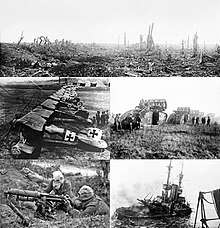

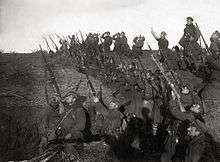
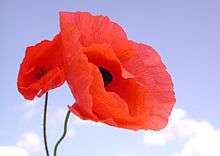
Between the crosses, row on row... ~ John McCrae
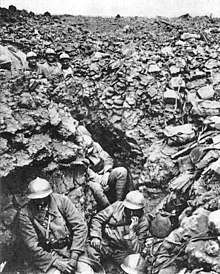
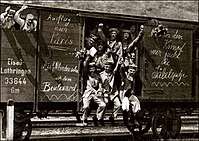
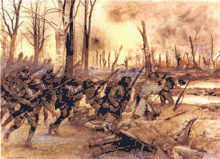
- Alphabetized by author
- If I am asked what we are fighting for, I can reply in two sentences. In the first place, to fulfill a solemn international obligation … an obligation of honor which no self-respecting man could possibly have repudiated.
I say, secondly, we are fighting to vindicate the principle that small nationalities are not to be crushed in defiance of international good faith at the arbitrary will of a strong and overmastering Power.- Herbert Asquith, Address to Parliament, (6 August 1914); as quoted in Source Records of the Great War, Vol. I, ed. Charles F. Horne, National Alumni (1923)
- Nothing will bring American sympathy along with us so much as American blood shed in the field.
- Winston Churchill, first lord of the Admiralty, memorandum to Prime Minister Sir Edward Grey and Lord Kitchener (September 5, 1914); Winston S. Churchill, The World Crisis, 1911–1914 (1923), 2d ed., vol. 1, p. 272.
- I think a curse should rest on me — because I love this war. I know it's smashing and shattering the lives of thousands every moment — and yet — I can't help it — I enjoy every second of it.
- Winston Churchill, A letter to a friend (1916).
- No compromise on the main purpose; no peace till victory; no pact with unrepentant wrong -- that is the Declaration of July 4th, 1918.
- Winston Churchill At a joint Anglo-American rally in Westminster, July 4, 1918, speaking against calls for a negotiated truce with Germany. As printed in War aims & peace ideals: selections in prose & verse (1919), edited by Tucker Brooke & Henry Seidel Canby, Yale University Press, p. 138.
- The Great War differed from all ancient wars in the immense power of the combatants and their fearful agencies of destruction, and from all modern wars in the utter ruthlessness with which it was fought. … Europe and large parts of Asia and Africa became one vast battlefield on which after years of struggle not armies but nations broke and ran. When all was over, Torture and Cannibalism were the only two expedients that the civilized, scientific, Christian States had been able to deny themselves: and they were of doubtful utility.
- Winston Churchill, From The World Crisis, 1911-1918 : Chapter I (The Vials of Wrath), Churchill, Butterworth (1923).
- After the end of the World War of 1914 there was a deep conviction and almost universal hope that peace would reign in the world. The heart's desire of all the peoples could have easily been gained by steadfastness in righteous convictions, and by reasonable common sense and prudence. The phrase "the war to end war" was on every lip, and measures had been taken to turn it into reality. President Wilson, wielding, as was thought, the authority of the United States, had made the conception of a League of Nations dominant in all minds. The British Delegation at Versailles moulded and shaped his idea into an Instrument which will for ever constitute a milestone in the hard march of man. The victorious Allies were at that time all-powerful, so far as their outside enemies were concerned. They had to face grave internal difficulties and many riddles to which they did not know the answer, but the Teutonic Powers in the great mass of Central Europe were prostrate before them, and Russia, already shattered by the German flail, was convulsed by civil war and falling into the grip of the Bolshevik or Communist Party.
- Winston Churchill, From The Second World War: Volume 1: The Gathering Storm, Churchill, Houghton Mifflin (1948)
- If you hadn't entered the World War we would have made peace with Germany early in 1917. Had we made peace then there would have been no collapse in Russia followed by communism, no break-down in Italy followed by fascism, and Germany would not have signed the Versailles Treaty, which has enthroned nazi-ism in Germany. In other words, if America had stayed out of the war all of these "isms" wouldn't today be sweeping the Continent of Europe and breaking down parliamentary government, and if England had made peace early in 1917, it would have saved over 1,000,000 British, French, American, and other lives.
- Attributed to Winston Churchill, but denied by him. William Griffin, sworn statement (September 8, 1939), reprinted in the Congressional Record (October 21, 1939), vol. 84, p. 686. Griffin, publisher of the New York Enquirer, said the conversation had taken place in London during August 1936. Griffin brought a $1,000,000 libel suit against Churchill in October 1939, but the charges were dismissed on October 21, 1942, when Griffin or his lawyers failed to appear when the case was called. At that time Griffin was under indictment in Washington, D.C., on charges of conspiring to lower the morale of the armed forces of this country. In his answer to the suit, Churchill admitted the 1936 interview, but denied the statement. The New York Times (October 22, 1942), p. 13. The proceedings against Griffin were later quashed after a hearing in federal court on January 26, 1944.
- The Nation has need of all that can be contributed to it through the best efforts of all its citizens. The colored people have repeatedly proved their devotion to the high ideals of our country. They gave their services in the war with the same patriotism and readiness that other citizens did. The records of the selective draft show that somewhat more than 2,250,000 colored men were registered. The records further prove that, far from seeking to avoid participation in the national defense, they showed that they wished to enlist before the selective service act was put into operation, and they did not attempt to evade that act afterwards.
- Calvin Coolidge, as quoted in commencement address at Howard University (6 June 1924), Washington, D.C.
- In all countries, the First World War weakened old orthodoxies and authorities, and, when it was over, neither government nor church nor school nor family had the power to regulate the lives of human beings as it had once done. One result of this was a profound change in manners and morals that made a freer and less restrained society. Women benefited from this as much as anyone else. Time-worn prescriptions concerning what was or was not proper behavior for them no longer possessed much credibility, and taboos about unaccompanied appearances in public places, or the use of liquor or tobacco, or even pre-marital sexual relationships had lost their force. ... [W]omen were no longer as vulnerable to the tyranny of society as they had been [before].
- Gordon A. Craig, The Germans, (1991), New York: Merdian. p. 161.
- Come on, you sons of bitches, do you want to live forever?
- Daniel Daly, Battle cry at the Battle of Belleau Wood, World War I, June 1918
- We are not going to lose this war, but its prolongation will spell ruin for the civilised world, and an infinite addition to the load of human suffering which already weighs upon it...We do not desire the annihilation of Germany as a great power ... We do not seek to impose upon her people any form of government other than that of their own choice... We have no desire to deny Germany her place among the great commercial communities of the world.
- Henry Petty Fitzmaurice, 5th_Marquess of Lansdowne, Lansdowne Letter, The Daily Telegraph, (29 November 1917).
- This is not a peace. It is an armistice for 20 years.
- Ferdinand Foch, Said after the Treaty of Versailles, as quoted in Memoires (1963) by Paul Reynaud, vol. 2, p. 457.
- At eleven o’clock this morning came to an end the cruellest and most terrible War that has ever scourged mankind. I hope we may say that thus, this fateful morning, came to an end all wars.
- David Lloyd George, Speech in the House of Commons, (11 November 1918).
- The lamps are going out all over Europe: we shall not see them lit again in our life-time."
- Edward Grey, Vol. 2, ch. 18, "lamps+are+going" p. 20 books.google
- On his famous remark, in August of 1914, about the impending outbreak of the First World War
- Cf. John Alfred Spender: Life, Journalism and Politics, Vol. 2, Frederick A. Stokes Company, New York 1927. Chp. 20, p. 14 archive.org and w:The lamps are going out.
- Are we virtuous merely because we are restrained by the fetters of the law? We hear men prophecy that this war means the death of Christianity and an era of Pandeism or perhaps even the destruction of all which we call modern civilization and culture. We hear men predict that the ultimate result of the war will be a blessing to humanity.
- Louis S. Hardin, '17, "The Chimerical Application of Machiavelli's Principles", w:Yale Sheffield Monthly, pp 461–465, w:Yale University, May 1915, p. 463.
- The Frogs" and "Joe Latrino" boys had been whispering the fini la guerre for so long that when the news did reach us, we didn't believe it. The official report caught us just about midnight along the main drag southwest of Sedan, which had been reached by some of the units of the outfit in competition with other American divisions and the French. He only thing we had to celebrate with were grenades, rockets, rifles, etc., and everybody did. The bedlam wore off about daybreak. The waffle boys of the staff drove up in their big limousines and shiny uniforms and boots and demanded: "Where are your men?" The captain pointed. Here and there in a rain-soaked field and out in the open in the steady drizzle, there were the men, sleeping singly, coiled up like a dog, or in twos or threes, anything to keep warm.
- Rondo Hatton, "News Hounds, Once Doughboys, Describe First Armisitice Day: South of Sedan," The Tampa Times (November 12, 1928), p. 11
- To me the war was an abomination, a madness, a crime, and from the first moment onwards–more out of impulse than reflection–I inwardly rejected it and could never reconcile myself with it up to this very moment.
- Alexandra Kollontai, The Autobiography of a Sexually Emancipated Communist Woman (1926), Translated by Salvator Attanasio, Herder and Herder, 1971.
- [T]o claim that the over 100,000 American soldiers who died on the front lines in World War I were defending American freedoms, as Memorial Day speakers like Obama do year after year, is simply a lie. World War I was never about a threat to America. It was a war of empire, fought by the European powers, none of which was any better or worse than the others, and the US joined that conflict not for noble reasons or for defense, but in hopes of picking up some of the pieces. My own maternal grandfather, a promising sprinter who had Olympic aspirations, was struck with mustard gas in the trenches and, unable to run anymore with his permanently scarred lungs, ended up having to settle for coaching high school as a career. (My paternal grandfather won a silver star for heroism as an ambulance driver on the front, but was so damaged by what he experienced that he never talked about it at all, my father says.) Sadly, their sacrifices and heroism served no noble cause.
- Dave Lindorff, The Glorification of War (May 31, 2010), CounterPunch.
- In Flanders fields the poppies blow
Between the crosses, row on row,
That mark our place; and in the sky
The larks, still bravely singing, fly
Scarce heard amid the guns below.
We are the Dead. Short day ago
We lived, felt dawn, saw sunset glow,
Loved and were loved, and now we lie,
In Flanders fields.
Take up our quarrel with the foe:
To you from failing hands we throw
The torch; be yours to hold it high.
If ye break faith with us who die
We shall not sleep, though poppies grow
In Flanders fields.- John McCrae, In Flanders Fields (1915).
- I foresee that very soon I shall be overwhelmed by the pressure forced upon me and be forced to take extreme measures which will lead to war. To try and avoid such a calamity as a European war I beg you in the name of our old friendship to do what you can to stop your allies from going too far. Nicky.
- Nicholas II of Russia, telegraph to Wilhelm II, German Emperor; as quoted in Bernstein, Herman (1918) The Willy-Nicky Correspondence: Being the Secret and Intimate Telegrams Exchanged between the Kaiser and the Tsar.
- For all the astounding growth in man’s power, there had been no parallel increase in responsibility. The caveman with the club was now a caveman with a machine gun.
- John O'Farrell An Utterly Impartial History of Britain (2007)
- What passing-bells for these who die as cattle?
Only the monstrous anger of the guns.
- After the World War, millions wanted anything that would help them forget the filth of human combat and the criminal stupidity of war-makers. Today, nobody needs or wants that variety of oblivion. Still there remains a widespread interest both in oblivion and in war. The causes have changed, and so, too, have the special publics.
Take the shift in war interest. Men and women who were involved in the World War still smell its stench, and hate it, gore and glory alike. But we have with us to-day tens of millions of young adults who were babes and juveniles between the years 1914 and 1918. While the fighting was going on, they understood nothing and experienced little, save the flag waving and the silly propaganda of the governments. As the years passed, they listened to the veterans, to the tales of returning tourists, and to the swelling chorus of poets and novelists who cashed in on the bloody episode. They realized that they had missed something big, and they were deceived about its nature, just as we all are deceived by stories of things we have never seen face to face. So, to the rising generation of to-day, the War is a strange alluring welter of romance. It is an escape from office drudgery and school lessons, just as in 1917 the oblivion of wild parties was an escape from the nasty monotony of the trenches.- Walter B. Pitkin and William M. Marston, “The Art of Sound Pictures” D. Appleton and Company, New York London (1930), CHAPTER II WHAT PEOPLE WANT, pp. 18-19.
- The transformation came on even more abruptly than is usually realized. World War I and the postwar revolutions still formed part of the nineteenth century. The conflict of 1914-18 merely precipitated and immeasurably aggravated a crisis that it had not created. But the roots of the dilemma could not be discerned at the time; and the horrors and devastations of the Great War seemed to the survivors the obvious source of the obstacles to international organization that had so unexpectedly emerged.
- Karl Polanyi, The Great Transformation (1944), Ch. 2 : Conservative Twenties, Revolutionary Thirties
- Some of us still recall World War I, which awakened our generation to the fact that history was not a matter of the past, as a thoughtless philosophy of the hundred years’ peace would have us believe. And once started, it did not cease to happen. I will seek to evoke the scenes we have witnessed and take the measure of our frustrations. Great triumphs and grave disappointments have been met with. However, it is not a balance of our experiences, achievements and omissions that stands to question; nor am I scanning the horizon for a mere break. The time has come to take note of a much bigger change.
- Karl Polanyi, "For a New West" (1958)
- In war-time the word patriotism means suppression of truth.
- Siegfried Sassoon in Memoirs of an Infantry Officer.
- The First World War had begun – imposed on the statesmen of Europe by railway timetables. It was an unexpected climax to the railway age.
- A. J. P. Taylor, The First World War ([1963] 1970) p. 20
- The First World War killed fewer victims than the Second World War, destroyed fewer buildings, and uprooted millions instead of tens of millions — but in many ways it left even deeper scars both on the mind and on the map of Europe. The old world never recovered from the shock.
- Edmond Taylor, in The Fossil Monarchies.
- Immediate affirmative clear and unmistakable answer from your government is the only way to avoid endless misery. Until I have received this answer alas, I am unable to discuss the subject of your telegram. As a matter of fact I must request you to immediately [sic] order your troops on no account to commit the slightest act of trespassing over our frontiers. Willy
- Wilhelm II, German Emperor, telegraph to Nicholas II of Russia; as quoted in Bernstein, Herman (1918) The Willy-Nicky Correspondence: Being the Secret and Intimate Telegrams Exchanged between the Kaiser and the Tsar.
- It is a fearful thing to lead this great peaceful people into war, into the most terrible and disastrous of all wars, civilization itself seeming to be in the balance. But the right is more precious than peace, and we shall fight for the things which we have always carried nearest our hearts, for democracy, for the right of those who submit to authority to have a voice in their own governments, for the rights and liberties of small nations, for a universal dominion of right by such a concert of free peoples as shall bring peace and safety to all nations and make the world itself at last free. To such a task we can dedicate our lives and our fortunes, everything that we are and everything that we have, with the pride of those who know that the day has come when America is privileged to spend her blood and her might for the principles that gave her birth and happiness and the peace which she has treasured. God helping her, she can do no other.
- Woodrow Wilson, address to a joint session of Congress recommending that Germany's course be declared war against the United States (April 2, 1917), Albert Shaw, ed., The Messages and Papers of Woodrow Wilson (1924), vol. 1, p. 382–83.
- God would never be cruel enough to create a cyclone as terrible as that Argonne battle. Only man would ever think of doing an awful thing like that. It looked like "the abomination of desolation" must look like. And all through the long night those big guns flashed and growled just like the lightning and the thunder when it storms in the mountains at home.
And, oh my, we had to pass the wounded. And some of them were on stretchers going back to the dressing stations, and some of them were lying around, moaning and twitching. And the dead were all along the road. And it was wet and cold. And it all made me think of the Bible and the story of the Anti-Christ and Armageddon.
And I'm telling you the little log cabin in Wolf Valley in old Tennessee seemed a long long way off.- Alvin York, in his account of 7 October 1918, in the Diary of Alvin York.
- We intend to begin on the first of February unrestricted submarine warfare. We shall endeavor in spite of this to keep the United States of America neutral. In the event of this not succeeding, we make Mexico a proposal of alliance on the following basis: make war together, make peace together, generous financial support and an understanding on our part that Mexico is to reconquer the lost territory in Texas, New Mexico, and Arizona. The settlement in detail is left to you. You will inform the President of the above most secretly as soon as the outbreak of war with the United States of America is certain and add the suggestion that he should, on his own initiative, invite Japan to immediate adherence and at the same time mediate between Japan and ourselves. Please call the President's attention to the fact that the ruthless employment of our submarines now offers the prospect of compelling England in a few months to make peace.
- Arthur Zimmermann, telegram to Heinrich von Eckardt, (January 1917).
- Gott strafe England.
- May God punish England.
- A common slogan of the German Army, attributed to Ernst Lissauer.
- It have been one of the richest experiences of my life...feeling that I was being really useful to the boys on the other side.
- Unidentified actress about working in a war factory. From an excerpt in Adriane Ruggiero, American Voices from World War I (2003), p. 79–80, citing Norma B. Kastl, "Wartime, the Place and the Girl", Independent magazine (unidentified issue).
Economic impact
- THE nitrogen fixation plants built by the government during the great war at a cost of about one hundred million dollars, to supply materials needed for making explosives and poisonous gases, had been idle since the Armistice. These plants could be utilized, whether sold to private corporations or operated by the government for the fixation of atmospheric nitrogen for industrial and agricultural purposes, and thus greatly increase the supply of nitrogen compounds needed in the industries, and stimulate the production of food through supplying nitrogen for the manufacture of fertilizer. The present anomalous situation in the government plants gives occasion for a survey of the remarkable chemical developments of recent years and of their importance for war and for peace. Nitrogen, tho the most important element needed for an adequate supply of fertilizer, is not the only one essential. Two others are also important: potash and phosphoric acid. All must be chemically combined in such a way as to be available as plant food.
Before the outbreak of the war potash was contained entirely from Germany, at a price maintained substantially above the cost of production by a German monopoly. Exports from Germany ceased early in 1915, and prices in the United States promptly rose to about ten times normal. Existing stocks were thereafter largely diverted to chemical uses, and relatively insignificant amounts were used in fertilizer from 1916 up to and including 1919.- Grinnell Jones, “Nitrogen: It's fixation, its uses in peace ad war”, The Quarterly Journal of Economics, Vol. 34, No. 3 (May, 1920), pp. 391-392.
- Since sulphuric acid in enormous amounts was required for the manufacture of explosives, much of our supply was diverted from the making of fertilizer to direct war use. However, most manufacturers of fertilizer make the acid they need, and hence this diversion did not result in direct financial loss. But their regular business was disorganized and their customers suffered from the disruption. As a direct result of the war demands for sulphuric acid the productive capacity for the manufacture of sulphuric acid in the United States is now more than twice what it was in 1914.
- Grinnell Jones, “Nitrogen: It's fixation, its uses in peace ad war”, The Quarterly Journal of Economics, Vol. 34, No. 3 (May, 1920), p.393.
Chemical warfare
- The Haber-Bosch process is generally credited with keeping Germany supplied with fertilizers and munitions during World War I, after the British naval blockade cut off supplies of nitrates from Chile. During the war Haber threw his energies and those of his institute into further support for the German side. He developed a new weapon—poison gas, the first example of which was chlorine gas—and supervised its initial deployment on the Western Front at Ypres, Belgium, in 1915. His promotion of this frightening weapon precipitated the suicide of his wife, who was herself a chemist, and many others condemned him for his wartime role. There was great consternation when he was awarded the Nobel Prize in Chemistry for 1918 for the synthesis of ammonia from its elements.
- Science History Institute, "Fritz Haber", (December 7, 2017).
Tank Corps
- Fuller later recalled his own epiphany. He’d gone to Yvranch, France, home of the army’s Heavy Section, as Tank Corps was then called, to watch the demonstration of a remarkable new weapon. (In fact, about all the Heavy Section was doing in those days was putting on daily maintenance-intensive dog-and-pony shows for visiting officers, sending its crude tanks to trundle over berms, cross trenches and, of course, crush trees like matchsticks.) “Everyone was talking and chatting,” Fuller wrote, “when slowly came into sight the first tank I ever saw. Not a monster but a very graceful machine with beautiful lines.…Here was the missing tool of penetration, the answer to the dominance on the battlefield of small-arms fire.” Fuller had found the antidote to the all-powerful machine gun.
Fuller’s first actual tank operation was the April 1917 Battle of Arras. As a demonstration of the tank’s capability the operation was a failure, at least in part because tankers ignored Fuller’s advice to deploy en masse and instead fed the tanks—mostly clapped-out training vehicles shipped from England—into battle a few at a time. Nor did it help that the army insisted on a traditional pre-attack artillery bombardment, a tactic anathema to Fuller, as it both eliminated any element of surprise and so thoroughly chewed up the ground that many of the tanks were immobilized.
The Battle of Cambrai in November and December 1917 was the Tank Corps’ greatest wartime success, as it punched a horde of tanks through the Hindenburg Line in a stunning example of Fuller’s penetration tactics. Fuller had wanted to lead the central charge, but his commander, Lt. Col. Hugh Elles, turned him down and directed the battle himself from his tank “Hilda,” becoming a fleeting national hero as a result.
Still, Cambrai wasn’t a clear-cut enough victory to establish Tank Corps as part of the varsity. Field Marshal Douglas Haig instead relegated tanks to a defensive role, much to Fuller’s chagrin. The iron monsters were strung out along a 65-mile front, either dug into pits or otherwise fortified—parked pillboxes, in effect—where “this beast would squat and slumber until the enemy advanced,” Fuller later mocked, “when it would make warlike noises and pounce upon him.”
Fuller’s finest wartime moment was the promulgation of his Plan 1919. Believing World War I would continue into 1919, he suggested victory with a single penetrating, surprise, mass tank attack aimed not at killing lots of German soldiers but at reaching and killing the enemy “brain”—the rear-area command-and-communications infrastructure—and thus paralyzing the body. But Fuller’s most meaningful tactical concept came to naught, as the war ended in November 1918. Had it continued, Fuller today might be as widely known as Guderian, Montgomery and Patton.- Stephan Wilkinson, “J.F.C. “Boney” Fuller – Wacko Genius of Armored Warfare”, History.net.
Battle of Verdun
- The Battle of Verdun was the longest sustained conflict of World War I. The battle, which lasted 300 days and cost more than 300,000 French and German lives in 1916, was also one of the bloodiest of “The Great War.”
The intense fighting and shelling near the tiny town of Verdun has permanently altered the region surrounding the Meuse River in northeastern France. The environmental destruction left by the battle led to the creation of the Zone Rouge—the Red Zone.
The Zone Rouge is a 42,000-acre territory that, nearly a century after the conflict, has no human residents and only allows limited access
Before World War I, the landscape of Verdun was different.
“It was farmland,” says British historian and author Christina Holstein. “There was a very big garrison in Verdun, a peacetime garrison with 66,000 men, so they had to be fed. Verdun was farmed. It was not heavily forested.”
That changed with the onset of war in 1914. By 1916, French and German forces had amassed significant munitions in the area—millions of rounds of ammunition and heavy, cannon-size guns.
Holstein says the conflict at Verdun was the first of the great artillery battles of the war.
“During that time, the shelling never stopped,” she says. “Millions and millions and millions of artillery shells were fired.”- Christina Holstein in “Red Zone”, by Stuart Thornton, National Geographic, (May 1, 2014).
- “At the start of the battle, there were trenches, but as the months went by with shells falling all the time in many places, there weren’t any trenches at all,” Holstein says. “The ground was just completely churned up. Any trees were smashed, and men took shelter where they could, in shell holes and in holes in the ground.”
- Christina Holstein in “Red Zone”, by Stuart Thornton, National Geographic, (May 1, 2014).